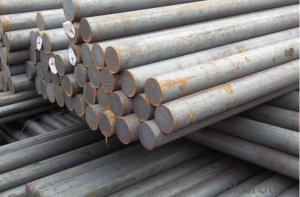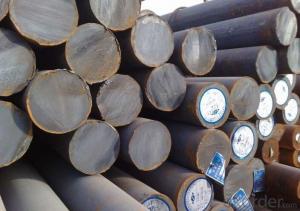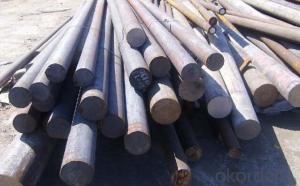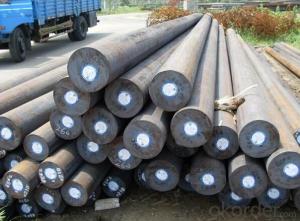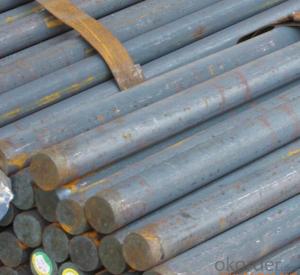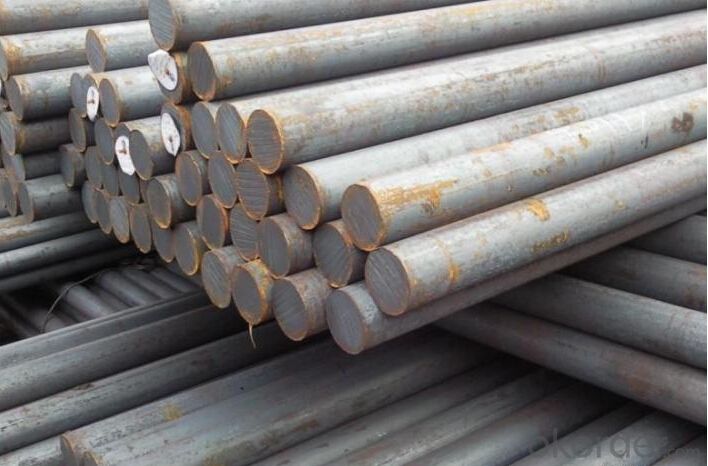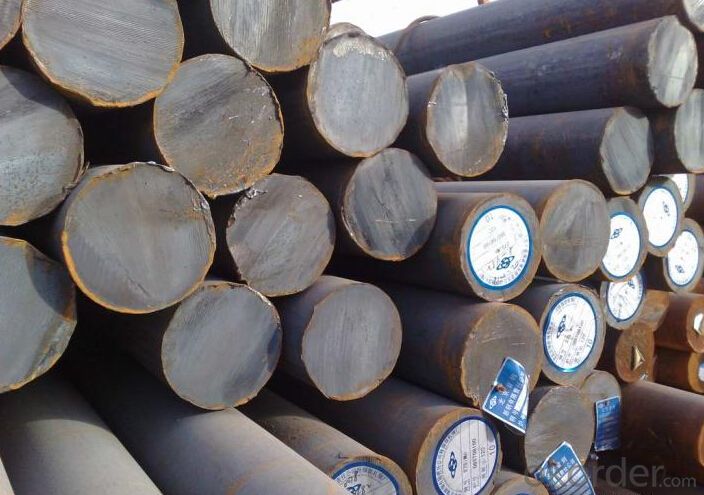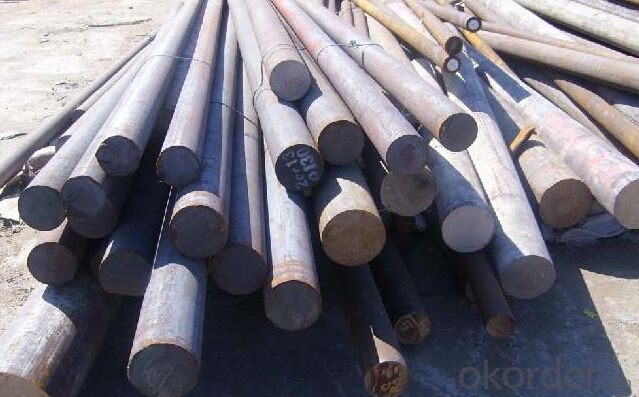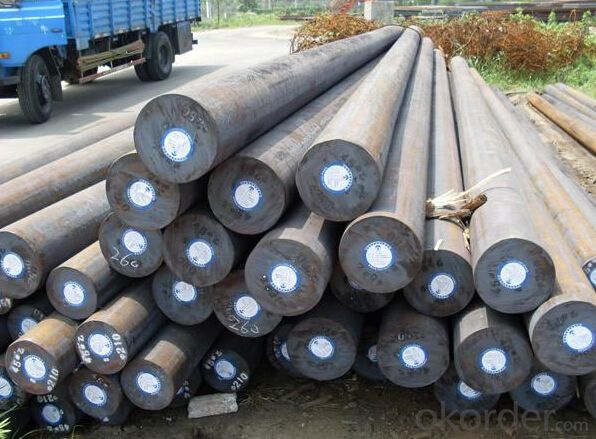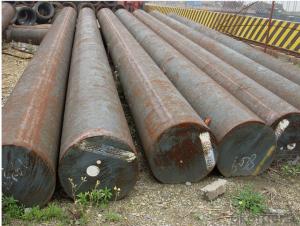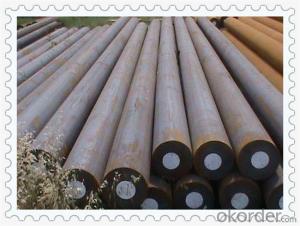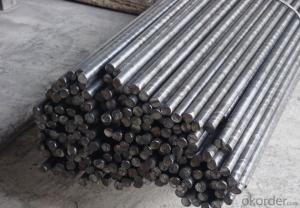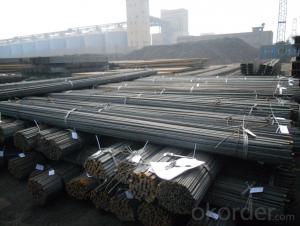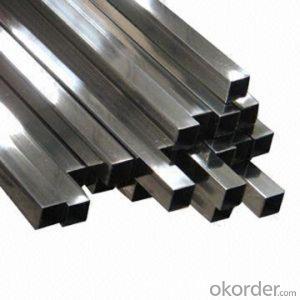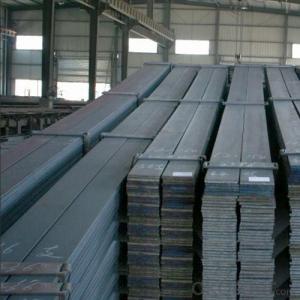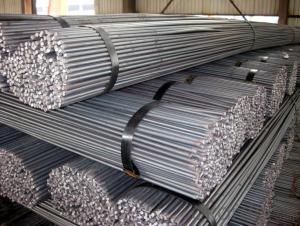Hot Rolled Mild Steel Round Bar Q235 Q345 Q355
- Loading Port:
- Tianjin
- Payment Terms:
- TT OR LC
- Min Order Qty:
- 3 m.t.
- Supply Capability:
- 10000 m.t./month
OKorder Service Pledge
OKorder Financial Service
You Might Also Like
Specification
Hot Rolled Mild Steel Round Bar Q235 Q345 Q355
Name | SAE1045 Carbon Steel Round Bar |
Shape | Round Bar/Square Bar/Flat Bar/Plate/Wire |
Standard | GB/ASTM/SAE/AISI/DIN/JIS/EN/BS |
Surface Treatment: | Black/Peeling/Polished/Machined |
Delivery Condition: | Hot Rolled or Forged/Peeled or Black Surface |
Test | SGS/UT 100% Elements Testing |
Certificate: | ISO/Mill Certificate |
Service: | 24 hours online service / |
more than 20 years trading and manufacture | |
Quality Assurance: | the third party inspection, such as SGS, BV, TUV…etc. is acceptable |
Packaging Details: | seaworthy packaging or as per customer's packing instruction |
Products Overview
Product Name | Typical Grades | Diameter(mm) | Standard adopted |
Carbon Steel | 20 (1020/S20C/C22) | Ø16-Ø300 | GB/SAE/JIS/DIN |
40 (1040/S40C/C40) | |||
45 (1045/S45C/C45) | |||
Bearing Steel | GCr9 (51100/SUJ1) | Ø12-Ø250 | |
GCr15 (52100/SUJ2/100Gr6) | |||
GCr9SiMn (A485-Gr.1/SUJ3) | |||
Cr-Mo Steel | 20Cr (5120/SCr420H/20Cr4) | Ø12-Ø250 | |
40Cr (5140/SCr440/41Cr4) | |||
42CrMo(4140/SCM440/42CrMo4) | |||
Gear Steel | 20CrNiMo | Ø16-Ø600 | |
20CrMn(5115/SMnC420/20MnCr5) | |||
20CrNiMo(8620/SNCM220/20CrMiMo2) |
Packaging & Delivery
Packaging Detail | Sea worthy packing /as per customer's packing instruction |
Delivery Detail | 15 ~ 40 days after receiving the deposit |
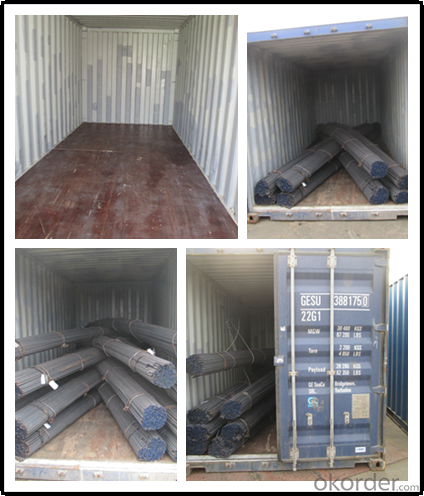
Product Show
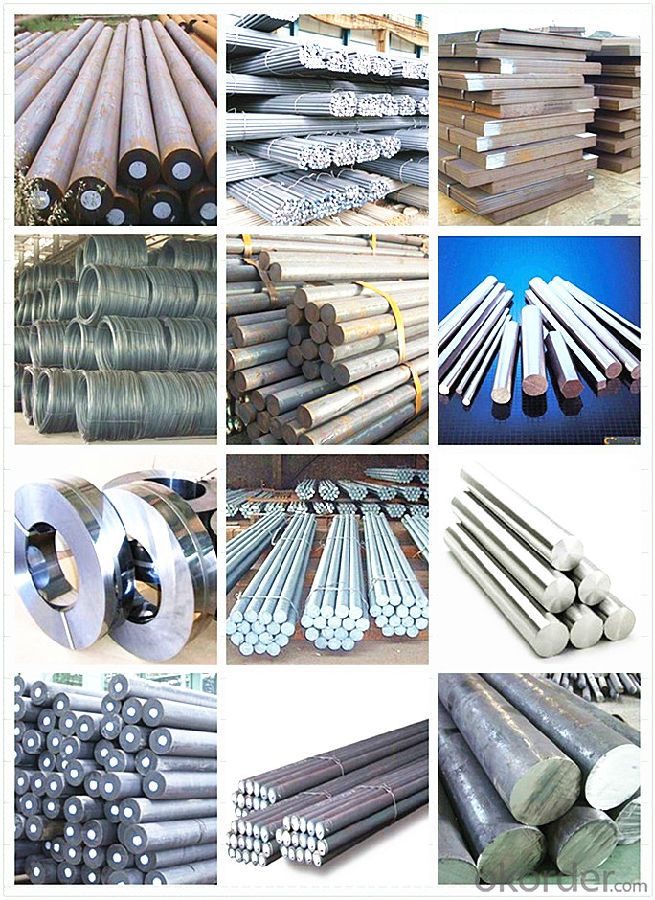
Workshop
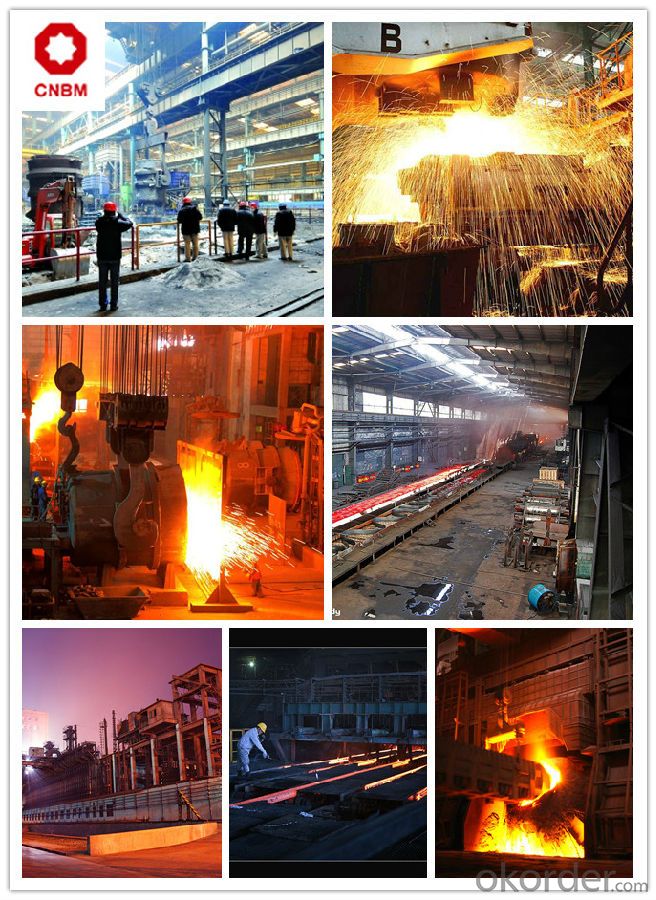
FAQ
Are you a trading company or manufacturer? | Manufacturer |
What’s the MOQ? | 3 metric ton |
What’s your delivery time? | 15-35 days after downpayment received |
Do you Accept OEM service? | Yes |
what’s your delivery terms? | FOB/CFR/CIF |
What's the Payment Terms? | 30% as deposit,70% before shipment by T/T |
Western Union acceptable for small amount. | |
L/C acceptable for large amount. | |
Scrow ,Paybal,Alipay are also ok | |
Why choose us? | Chose happens because of quality, then price, We can give you both. |
Additionally, we can also offer professional products inquiry, products knowledge train (for agents), smooth goods delivery, excellent customer solution proposals. | |
What's your available port of Shipment? | Main Port, China |
What’s your featured services? | Our service formula: good quality+ good price+ good service=customer's trust |
Where are your Market? | Covering more than 160 countries in the world |
- Q: What are the different shapes and forms in which special steel is available?
- Special steel is available in various shapes and forms such as bars, rods, sheets, plates, tubes, pipes, wires, and forgings.
- Q: What are the thermal properties of special steel?
- Special steels are highly sought-after in various applications due to their unique thermal properties. A key property of special steel is its exceptional thermal conductivity, enabling efficient heat transfer and dissipation. This characteristic renders special steel perfect for heat exchangers, facilitating effective heat transfer between fluids. Moreover, special steel boasts a high melting point, ensuring its structural integrity even under extreme temperatures. Consequently, it finds suitability in applications that involve exposure to extreme heat, such as furnaces or aerospace engines. Additionally, special steel exhibits superb thermal expansion properties, expanding and contracting consistently with temperature changes. This minimizes the risk of warping or cracking, which is crucial in applications requiring dimensional stability, such as precision instruments or high-temperature machinery. Furthermore, special steel possesses excellent resistance to thermal fatigue. It can endure repeated heating and cooling cycles without developing cracks or weakening. This property proves highly advantageous in applications subjected to cyclic thermal loading, such as automotive engine components or turbine blades. In conclusion, special steel offers high thermal conductivity, a high melting point, exceptional thermal expansion properties, and resistance to thermal fatigue. These desirable thermal properties make it a preferred choice across various industries, including automotive, aerospace, energy, and manufacturing, where thermal performance and durability are paramount.
- Q: What are the different joining processes for special steel?
- There are several different joining processes for special steel, including welding, brazing, soldering, and adhesive bonding. Welding involves melting and fusing the steel parts together, often using heat and pressure. Brazing and soldering involve using a filler metal with a lower melting point to join the steel parts. Adhesive bonding involves using a strong adhesive to bond the steel parts together. Each joining process has its own advantages and limitations, and the choice of process depends on factors such as the specific steel alloy, the strength requirements, and the application of the joined parts.
- Q: What are the different methods for improving the impact resistance of special steel?
- Special steel can be made more impact resistant through various methods. These methods fall into three main categories: heat treatment, alloying, and surface treatments. Heat treatment is a commonly used method to improve impact resistance. It involves carefully heating and cooling the steel to change its microstructure. Tempering and quenching are the two primary heat treatment processes used for this purpose. Tempering involves heating the steel to a specific temperature and then slowly cooling it. This helps to relieve internal stresses and increase toughness. On the other hand, quenching involves rapidly cooling the steel after heating it to a high temperature. This results in a hardened microstructure, which enhances impact resistance. Alloying is another method to enhance the impact resistance of special steel. By adding specific elements to the base steel, its properties can be improved. For instance, elements like manganese, nickel, or chromium can be added to increase toughness and impact resistance. These alloying elements modify the steel's microstructure, resulting in enhanced strength and resistance to deformation. Surface treatments are used to provide a protective layer on the steel's surface, thereby improving impact resistance. A commonly employed surface treatment is case hardening, which introduces carbon or nitrogen into the outer layer of the steel. This creates a hard surface while maintaining a tough core, resulting in improved impact resistance. Another surface treatment method is shot peening, where the steel surface is bombarded with small particles under high pressure. This induces compressive stresses in the surface layer, enhancing fatigue and impact resistance. In summary, the impact resistance of special steel can be improved through different methods, including heat treatment, alloying, and surface treatments. These methods can be applied individually or in combination to enhance the steel's mechanical properties, making it more resistant to impact and deformation.
- Q: How does special steel contribute to the automotive engine industry?
- Special steel plays a crucial role in the automotive engine industry by offering enhanced performance, durability, and efficiency. It is used to manufacture various engine components such as crankshafts, camshafts, connecting rods, and valves, which are subjected to high stress and temperature. The use of special steel ensures these components can withstand the demanding conditions and provide better power, fuel efficiency, and overall engine performance. Additionally, special steel enables engine manufacturers to reduce weight while maintaining structural integrity, contributing to improved fuel economy and reduced emissions.
- Q: How does special steel perform in welding applications?
- Special steel, also known as alloy steel, performs exceptionally well in welding applications. Its unique composition, which includes various alloying elements such as manganese, chromium, and nickel, enhances its weldability and overall performance. The addition of these alloying elements significantly improves the strength, hardness, and corrosion resistance of the steel, making it highly suitable for welding applications. Special steel possesses excellent weldability, allowing for easy fusion and formation of strong and durable weld joints. Furthermore, the alloying elements in special steel also contribute to its heat resistance, making it capable of withstanding high temperatures during the welding process without losing its structural integrity. This property is particularly crucial in applications where welding involves high heat levels or prolonged exposure to extreme temperatures. Moreover, special steel exhibits good ductility and toughness, enabling it to withstand the stresses and strains associated with welding. It can effectively absorb and disperse heat during the welding process, minimizing the risk of distortion or cracking in the welded joints. In addition to its mechanical properties, special steel also offers excellent resistance to corrosion and oxidation. This makes it highly suitable for welding applications in environments where exposure to moisture, chemicals, or harsh weather conditions is a concern. The corrosion resistance of special steel ensures that the welded joints maintain their strength and integrity over time, even in challenging environmental conditions. Overall, the performance of special steel in welding applications is outstanding, owing to its excellent weldability, strength, heat resistance, and corrosion resistance. Its unique composition and properties make it a preferred choice for a wide range of welding projects, including structural fabrication, pipeline construction, automotive manufacturing, and many more.
- Q: Can special steel be used for making nuclear industry components?
- Yes, special steel can be used for making nuclear industry components. Special steel, also known as alloy steel, possesses certain properties that make it suitable for use in the nuclear industry. These properties include high strength, excellent corrosion resistance, and good resistance to high temperatures and radiation. Nuclear industry components, such as reactor pressure vessels, steam generators, and fuel rods, operate under extreme conditions of high pressure, high temperature, and exposure to radiation. Special steel can withstand these conditions and maintain its structural integrity, ensuring the safe and reliable operation of nuclear facilities. The use of special steel in the nuclear industry also helps to prevent the release of radioactive materials. The high corrosion resistance of special steel reduces the risk of leakage and contamination, thereby enhancing the safety of nuclear power plants. Furthermore, special steel can be tailored to meet specific requirements of the nuclear industry. Different types of special steel alloys can be developed with specific compositions and heat treatments to optimize their properties for nuclear applications. This allows for the customization of steel components to meet the unique demands of the nuclear industry. In conclusion, special steel can indeed be used for making nuclear industry components due to its high strength, corrosion resistance, and resistance to high temperatures and radiation. Its use contributes to the safety and reliability of nuclear facilities, while also allowing for customization to meet specific requirements.
- Q: What are the applications of tool steel?
- Tool steel has a wide range of applications due to its high hardness, resistance to wear, and ability to retain sharp edges. It is commonly used in the manufacturing of cutting tools, dies, molds, and machine components that require high strength and durability. Additionally, tool steel finds its use in the automotive, aerospace, and construction industries, where its properties are crucial for efficient and precise operations.
- Q: Is special steel suitable for structural applications?
- Yes, special steel is suitable for structural applications. Special steel refers to high-quality steel that is specially engineered to have specific properties and characteristics to meet the demands of various applications. It is often used in industries such as construction, automotive, aerospace, and oil and gas. Special steel is known for its exceptional strength, durability, and resistance to corrosion, making it an ideal material for structural applications. It can withstand heavy loads, high temperatures, and extreme weather conditions, ensuring the safety and longevity of structures. Additionally, special steel offers excellent weldability, machinability, and formability, allowing for flexibility in design and construction. It can be easily shaped, fabricated, and assembled into various structural components, making it suitable for complex and unique projects. Furthermore, special steel is available in a wide range of grades and types, each with specific properties tailored for different structural requirements. These include carbon steel, alloy steel, stainless steel, and tool steel, among others. This versatility allows engineers and designers to select the most suitable type of special steel for their specific application, ensuring optimal performance and cost-effectiveness. In conclusion, special steel is highly suitable for structural applications due to its exceptional strength, durability, resistance to corrosion, and flexibility in design. Its wide range of grades and types offers engineers and designers the ability to choose the most appropriate material for their specific project requirements.
- Q: What are the challenges in welding special steel alloys?
- Welding special steel alloys presents various obstacles due to their distinct properties and composition. Key challenges encountered when welding special steel alloys include the following: 1. Elevated melting point: Special steel alloys typically possess higher melting points compared to regular steel, necessitating increased heat input during the welding process. This can create difficulties in achieving proper fusion and may require specialized welding equipment and techniques. 2. Disparity in thermal expansion: Special steel alloys may exhibit different coefficients of thermal expansion in comparison to the base metal or other materials being joined. This can result in the development of stress and distortion during welding, impacting the structural integrity of the welded joints. 3. Heat sensitivity: Certain special steel alloys are more susceptible to heat-affected zone (HAZ) cracking and other forms of weld defects. The heightened heat input during welding can induce the formation of brittle phases or precipitates, leading to reduced mechanical properties and potential weld failures. 4. Metallurgical alterations: Welding special steel alloys can bring about significant metallurgical changes in the base metal and the heat-affected zone. These changes encompass the formation of new microstructures, variations in hardness, and modifications in chemical composition. Such alterations can affect the overall performance and properties of the welded joints. 5. Pre-weld and post-weld treatments: Specific pre-weld and post-weld treatments are often required for special steel alloys to minimize the risk of weld defects and optimize the properties of the welded joints. These treatments may encompass preheating, post-weld heat treatment, or the utilization of specialized filler metals to ensure adequate weld integrity. 6. Limited consumable availability: Special steel alloys may have a limited selection of suitable consumables, such as filler metals and shielding gases, which are vital for achieving high-quality welds. The absence of appropriate consumables can make it challenging to find compatible materials that offer sufficient strength and corrosion resistance in the welded joints. To overcome these challenges effectively, it is essential to possess a comprehensive understanding of the specific properties and requirements of the special steel alloy being welded. The utilization of proper welding techniques, including heat control, filler material selection, and post-weld treatments, is crucial to ensure welds of superior quality with optimal mechanical properties and structural integrity. Moreover, collaborating with material suppliers, welding experts, and adhering to industry standards and guidelines can facilitate the effective resolution of challenges associated with welding special steel alloys.
Send your message to us
Hot Rolled Mild Steel Round Bar Q235 Q345 Q355
- Loading Port:
- Tianjin
- Payment Terms:
- TT OR LC
- Min Order Qty:
- 3 m.t.
- Supply Capability:
- 10000 m.t./month
OKorder Service Pledge
OKorder Financial Service
Similar products
Hot products
Hot Searches
Related keywords

